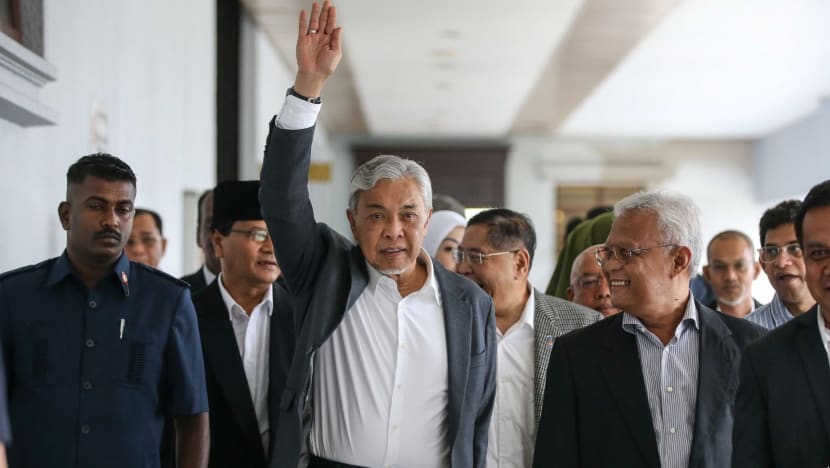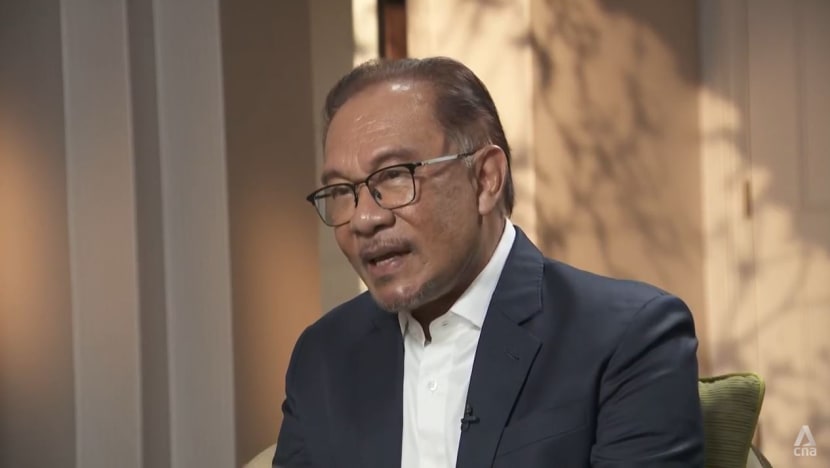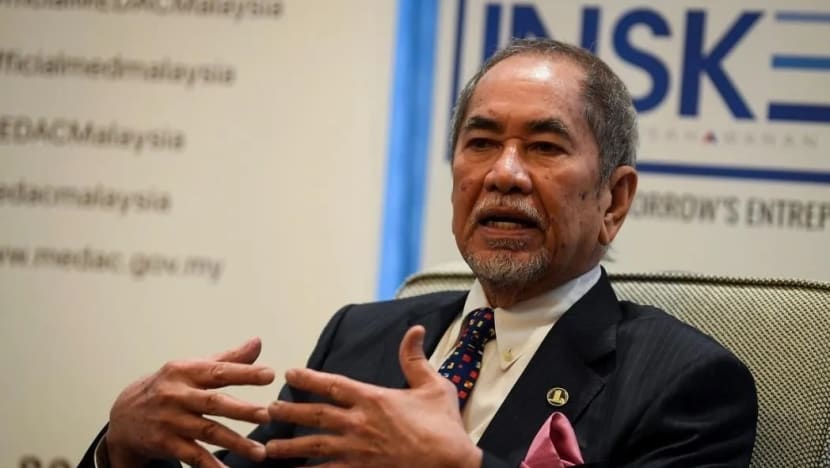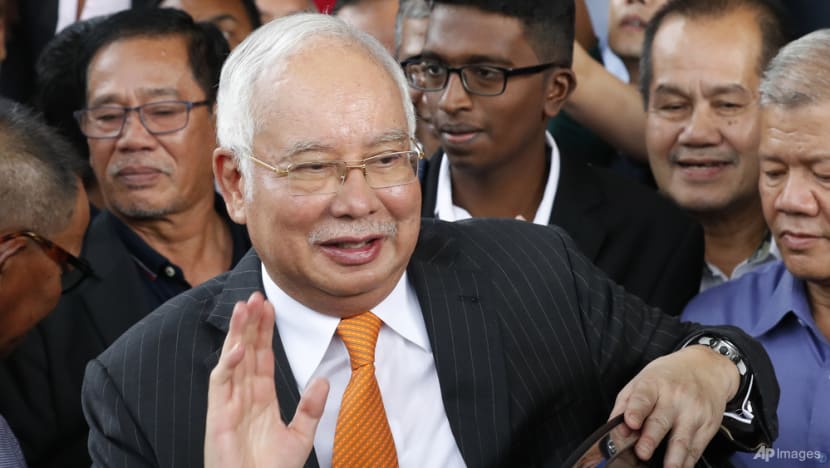Analysis: Anwar lauded for efforts to split Attorney-General’s dual roles, but urgency needed to show he means business

Malaysia’s Deputy Prime Minister Ahmad Zahid Hamidi gestures outside the High Court after the discharge not amounting to an acquittal in relation to his Yayasan Akalbudi graft case. (Photo: Bernama)
- Debate over conflict of interest in the dual roles of Malaysia's Attorney-General as the government’s chief legal adviser and lead criminal prosecutor has come to the fore with Deputy Prime Minister Ahmad Zahid Hamidi’s recent acquittal
- Some in the legal industry say that the government’s efforts to split the AG’s roles lack urgency and could lead to more high-profile criminal cases being dropped
- One legal expert calls for Malaysia to emulate former British colonies Australia and Mauritius in their efforts to split the AG’s role
JOHOR BAHRU: Malaysia’s renewed efforts to split the dual roles of its Attorney-General (AG) as the government’s legal adviser and public prosecutor have won praise from civil society groups and observers, amid public criticisms against the prosecution’s move to drop corruption charges against a deputy prime minister.
But while they laud the proposed move for effecting a better separation of powers, some have voiced concerns that the lack of urgency with no clear or shorter timeline given could raise the possibility of more high-profile criminal cases being dropped in the near term.
The latest moves by Malaysia on reforming the AG’s roles were announced by Minister in the Prime Minister's Department (Law and Institutional Reform) Azalina Othman Said on Wednesday (Sep 13), saying it would be forming two special task forces to expedite the process as part of efforts to expedite institutional reforms.
She said a comparative study taskforce would be conducting research on several Commonwealth countries in order to obtain publicly inaccessible data while a technical task force would conduct a comprehensive study within a year on the financial, legal, and staffing implications of the proposed reforms.
The announcement came amid intense criticism against Prime Minister Anwar Ibrahim’s administration after the High Court granted a request from prosecutors for money laundering, criminal breach of trust and corruption charges against Deputy Prime Minister Ahmad Zahid Hamidi to be given a discharge not amounting to an acquittal (DNAA).

Among them included Muar Member of Parliament Syed Saddiq Abdul Rahman who said that it was the “beginning of normalising corruption” for Mr Anwar’s unity government, despite having made combatting graft a top priority.
The former youth and sports minister, who is the Malaysian United Democratic Alliance's (MUDA) only representative in the federal parliament, pulled his support for the government last Sunday, causing the unity coalition to lose its two-thirds majority in the legislative assembly.
On the efforts to split the AG’s roles, non-governmental group, The Coalition for Clean and Fair Elections, which is better known as Bersih, said it welcomed the move but added that Mr Anwar needs to “publicly declare a timeline” to “demonstrate its political will”.
The group suggested that Mr Anwar commit to implementing the separation by 2025 and hence reduce the technical task force’s one-year timeframe to that of six to eight months to expedite the process.
“A refusal to provide a clear deadline will create a public perception that the task forces are mere diversions to fend off public anger over the DNAA granted to Ahmad Zahid Hamidi last week,” said Bersih.
INHERENT CONFLICT OF INTEREST IN AG ROLE
In recent years, politicians across both sides of the aisle as well as senior members of Malaysia’s legal fraternity have called for the separation of the AG roles as both the government’s legal adviser and public prosecutor, citing what is perceived as an inherent conflict of interest.
Legal scholar Shad Saleem Faruqi from Universiti Malaya's Faculty of Law told CNA that the AG’s role as the government’s chief legal adviser encompasses drafting laws and being part of the executive arm of the government.
He added that the public prosecutor, on the other hand, is supposed to act in the interest of society to enforce criminal justice against all violators of the law without fear or favour of the high and mighty.
“The AG acts in the government's best interests and serves and supports the political executive to the hilt. He defends the government if it is sued in court, whether the government is right or wrong,” said Prof Shad Saleem.
“The problem is that in Malaysia, unlike many other rule of law societies, the offices of the AG and PP (public prosecutor) are fused. Due to this fusion, there is a clear conflict of interest when grave offences are committed by the prime minister, Cabinet ministers, senior public servants and the elites of society.”
He also outlined the AG’s “extremely fragile” position given that the appointee can be removed from office at any time by the prime minister, creating problems of independence, accountability and transparency.
Prof Shad Saleem cited how in 2015, then-AG Abdul Gani Patail was sacked while heading a task force investigating claims of misappropriations of government funds in 1Malaysia Development Berhad (1MDB) involving then-prime minister Najib Razak.
“In litigation cases against members of the government, the AG is put in the position of a referee and also the goalkeeper or striker in a football game,” said Prof Shad Saleem.
"REFORMS NEED TO BE IMPLEMENTED QUICKLY"
While many have lauded efforts by Mr Anwar’s government to take initial steps in restarting this reform that was also attempted by his predecessors, some have questioned if there is political will on his part to see it through or whether it is merely a public relations move to deflect criticism on Ahmad Zahid’s DNAA.
Lawyer Lim Wei Jiet, who owns his own legal firm LWJ Advocates and Solicitors, has questioned the one-year timeline stated by Ms Azalina for the technical task force to prepare an interim report.
“I believe it is a move in the right direction. But I do not understand why they are looking at a one-year timeline or more for mere reports to be completed (not even the tabling of a Bill),” Mr Lim told CNA.
“Past history has taught us that reforms need to be implemented quickly, otherwise the tide of other unfolding drama will just bury it away.”
Mr Lim noted how the split of the AG’s role is not a new issue and had been raised by the government in previous administrations.
In September 2022, the government under Prime Minister Ismail Sabri Yaakob said that it was studying the implications of the proposed separation of powers between the AG and public prosecutor.

However, then-Minister in the Prime Minister’s Department (Parliament and Law) Wan Junaidi Tuanku Jaafar reportedly said it was not easy to implement as it requires amending the Federal Constitution and would require additional government spending.
In 2021, his predecessor Takiyuddin Hassan under the previous Muhyiddin Yassin administration reportedly said that a Cabinet Ministers Memorandum (MJM) was being finalised to amend the federal Constitution to split the powers of the AG.
Given that there have already been efforts to get the process going, the persistent delay has left some to question why the Anwar administration timeline seems delayed.
“So, has the Cabinet received the MJM? Is a comprehensive study still needed, when a number of studies has also been done in the past years on the separation of the two offices?” Multimedia University law lecturer Hafiz Hassan told CNA.
“Substantial work, on the law and technical side, may have already been done and (pushing through the reforms) is there for the taking, so to speak. Azalina just needs to walk the talk - prove the government’s commitment to institutional reforms and restore the public's faith,” he added.
Chairman for NGO Bersih Thomas Fann told CNA that there “must be a stronger sense of urgency” when it comes to pushing through this reform to avoid more DNAA decisions for high-profile criminal cases, such as those for former prime minister Najib and his wife Rosmah Mansor.
Najib, 70, is serving a 12-year jail sentence for transferring RM42 million from SRC International, a former subsidiary of 1MDB into his personal bank accounts. However, he also faces several other graft charges linked to 1MDB.

On Tuesday, his lawyers told the media that Malaysian prosecutors have not appealed against his acquittal in a case of abusing his position as prime minister to amend a government audit into 1MDB. The Attorney-General’s Chambers was expected to appeal against Najib’s acquittal earlier in 2023.
Rosmah was sentenced to 10 years in jail and fined RM970 million (US$209.4 million) last September after she was found guilty of corruption. She is currently appealing the judgement.
Mr Fann told CNA: “Our concern is that before the separation of the AG and PP role takes place legally, there will be more DNAA of more high profile cases such as Najib and Rosmah. There should be a moratorium to not issue any DNAA findings until the AGs’ role is split.”
MALAYSIA SHOULD EMULATE LIKES OF AUSTRALIA, MAURITIUS
In her press conference on Wednesday, Ms Azalina said the proposed task force for comparative study will conduct evidence-based research from several countries such as England, Australia, Canada and Kenya to obtain more information that cannot be accessed through open data studies of global best practices.
She said this task force will also include representatives of the Parliament Special Select Committee, opposition Members of Parliament, the Attorney-General's Chambers (AGC) and the Legal Affairs Division (BHEUU), while the technical task force will be managed completely by the AGC and BHEUU.
Law lecturer Mr Hafiz added that Malaysia should mirror the likes of former British colonies Australia and Mauritius in their process in splitting the AG’s role.
In the Australian model, the AG — known as the First Law Officer — is an MP appointed by the governor-general on the prime minister’s advice. The appointee acts as the government’s principal legal adviser.
Mr Hafiz also pointed out that Australia has a Commonwealth Director of Public Prosecutions (CDPP), which carries out criminal prosecutions and operates independently of both the AG and the political process.
While Australian laws grant the AG the power to issue written directions or guidelines to the CDPP, the AG is required to first consult with the CDPP before issuing directions, and such directions have to be tabled in Australia’s Parliament, Mr Hafiz said.
He cited how Mauritius, an island republic located in the Indian Ocean, has also split the role of its procureur-peneral with the advent of the 1964 Constitution. The procureur-peneral’s duties in Mauritius were previously similar to that of the AG in Malaysia today.
In 1964, Mauritius then created two new offices, that of the AG which acts as the government’s legal adviser and the director of public prosecutions (DPP), two separate and distinct roles.
Mr Hafiz noted that both Singapore and Malaysia have the same model, in which the role of the public prosecutor and chief legal advisor to the government is fused under the AG.
However, he stressed that the political situation in Singapore is different than in Malaysia, and that the former has a reputation of incorruptibility.
“The public and international community generally has faith in the Singapore legal system, including in criminal prosecution,” said Mr Hafiz.
Mr Hafiz added that the call by activists and legal scholars for a transparent process and shorter timeline for the separation of the roles of the AG and public prosecutor in Malaysia “is not unreasonable”.
“Where there’s political will to separate the roles, there’s a way,” he told CNA.
















